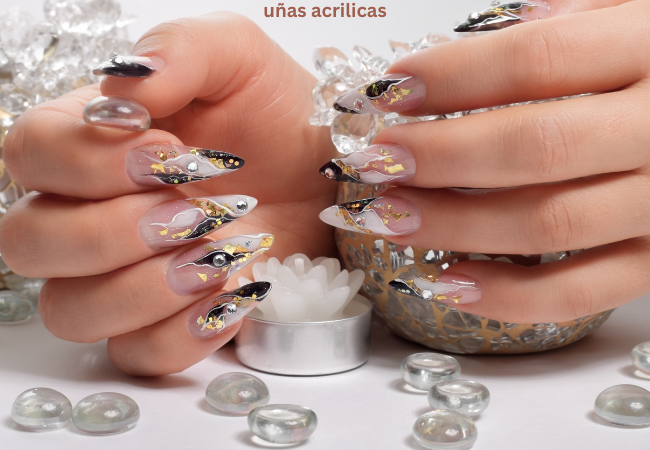Understanding uñas acrilicas
What areuñas acrilicas?
History and Evolution of Acrylic Nails
The concept of artificial nails dates back to ancient Egypt, where aristocrats used bone and ivory to lengthen their nails. Modern acrylic nails emerged in the 1950s, revolutionizing nail artistry with more advanced materials and techniques. Over the decades, acrylic nails have evolved with improved formulations and designs, becoming a staple in the beauty industry.
Benefits of Acrylic Nails
Durability
One of the primary benefits of acrylic nails is their durability. They are strong and can withstand everyday wear and tear, making them an excellent choice for individuals with weak or brittle nails.
Versatility
Acrylic nails offer unmatched versatility. They can be customized to any shape, length, or design, allowing for endless creativity and personalization.
Cost-Effectiveness
Compared to other nail enhancements, acrylic nails are relatively affordable. Their long-lasting nature means fewer trips to the salon, saving both time and money in the long run.
Types of uñas acrilicas
Traditional Acrylic Nails
Traditional uñas acrilicas involve the use of liquid monomer and powder polymer to create a hard protective layer over the natural nails.
Gel Acrylic Nails
Gel acrylic nails combine the strength of acrylic with the flexibility of gel. This hybrid method provides a more natural look and feel while maintaining durability.
Hybrid Acrylic Nails
Hybrid acrylic nails are a combination of traditional acrylic and gel methods, offering the best of both worlds in terms of strength and appearance.
How to Apply Acrylic Nails
Preparation
Before applying acrylic nails, it’s crucial to prepare the natural nails. This includes cleaning, trimming, and buffing the nails to create a smooth surface for the acrylic to adhere to.
Tools Required
- Acrylic liquid (monomer)
- Acrylic powder (polymer)
- Nail primer
- Nail forms or tips
- Acrylic brush
- Nail file and buffer
Step-by-Step Application Process
- Prep the Natural Nails: Clean and shape the nails, pushing back cuticles.
- Apply Nail Forms or Tips: Secure the forms or tips to create the desired length and shape.
- Mix Acrylic Liquid and Powder: Dip the brush into the liquid monomer and then into the acrylic powder to form a bead.
- Apply the Acrylic Bead: Place the bead on the nail and sculpt it into shape, working quickly as it hardens.
- File and Shape: Once the acrylic has dried, file and shape the nails to the desired finish.
- Apply Top Coat: Seal the nails with a top coat for added shine and protection.
Acrylic Nails vs. Other Nail Enhancements
Acrylic vs. Gel Nails
Acrylic nails are known for their strength, while gel nails offer a more natural appearance. Both have their pros and cons, but the choice ultimately depends on personal preference and nail type.
Acrylic vs. Dip Powder Nails
Dip powder nails involve a similar process but use a pigmented powder instead of liquid and powder acrylic. Dip nails are often considered less damaging and easier to remove.
Pros and Cons
Acrylic Nails:
- Pros: Durable, customizable, affordable
- Cons: Can be damaging if not applied or removed correctly, strong odor during application
Gel Nails:
- Pros: Natural look, flexible, less odor
- Cons: Less durable, requires UV light for curing
Popular Acrylic Nail Designs
Classic French Tips
French tips are a timeless design featuring white tips on a nude or pink base, offering a clean and elegant look.
Ombre
Ombre nails blend two or more colors seamlessly, creating a gradient effect that can be customized with various color combinations.
Glitter and Embellishments
Adding glitter, rhinestones, and other embellishments can enhance the overall look of acrylic nails, making them perfect for special occasions.
Seasonal Designs
Celebrate different seasons and holidays with themed nail art, incorporating colors and patterns that reflect the time of year.
Maintenance and Care for Acrylic Nails
Daily Care Tips
- Avoid using your nails as tools to prevent breakage.
- Keep your hands and nails moisturized to prevent dryness and lifting.
- Wear gloves when doing household chores to protect your nails from harsh chemicals.
Avoiding Common Issues
To avoid issues like lifting or yellowing, ensure proper application and regular maintenance. Schedule fill-ins every 2-3 weeks to keep your nails looking fresh.
When to Get Fill-Ins
Fill-ins are necessary every 2-3 weeks to fill the gap between the acrylic and natural nail growth. This maintains the nail’s strength and appearance.
Removing Acrylic Nails Safely
Tools Needed
- Acetone
- Cotton balls
- Aluminum foil
- Nail file
- Cuticle pusher
Step-by-Step Removal Process
- File the Top Layer: Use a nail file to remove the top layer of acrylic.
- Soak Cotton Balls in Acetone: Place soaked cotton balls on each nail and wrap with aluminum foil.
- Wait for 15-20 Minutes: Allow the acetone to break down the acrylic.
- Remove the Foil and Cotton Balls: Gently push off the softened acrylic with a cuticle pusher.
- Buff and Moisturize: Buff the nails and apply cuticle oil to nourish them.
Post-Removal Nail Care
After removing acrylic nails, give your natural nails a break to recover. Use strengthening treatments and moisturizers to restore their health.
Common Problems and Solutions
Lifting
Lifting occurs when the acrylic separates from the natural nail. This can be prevented by ensuring proper application and avoiding water exposure.
Yellowing
Yellowing can result from exposure to certain chemicals or UV light. Use a UV-protective top coat and avoid harsh chemicals to prevent this.
Breakage
To prevent breakage, avoid using your nails as tools and keep them at a manageable length.
Allergic Reactions
Some individuals may experience allergic reactions to the chemicals used in acrylic nails. If you notice redness, itching, or swelling, discontinue use and consult a professional.
Health and Safety Considerations
Hygiene Practices
Ensure the salon you visit follows strict hygiene practices, such as sterilizing tools and using fresh supplies for each client.
Potential Health Risks
Be aware of potential health risks like fungal infections or allergic reactions. Always choose a reputable salon and follow proper aftercare instructions.
Safe Salon Practices
Look for salons that prioritize cleanliness and use high-quality products. Don’t hesitate to ask about their hygiene practices.
DIY Acrylic Nails at Home
Pros and Cons
Pros:
- Cost-effective
- Convenient
- Creative control
Cons:
- Requires practice and skill
- Potential for damage if not done correctly
Essential Tools and Products
- Acrylic liquid and powder
- Nail forms or tips
- Acrylic brush
- Nail file and buffer
- Nail primer and top coat
Step-by-Step Guide
- Prep Your Nails: Clean and shape your nails.
- Apply Nail Forms or Tips: Attach the forms or tips securely.
- Mix Acrylic: Combine the liquid and powder to form a bead.
- Apply Acrylic: Sculpt the bead onto your nails.
- File and Shape: Smooth and shape the nails once the acrylic hardens.
- Finish with Top Coat: Apply a top coat for shine and protection.

Choosing the Right Nail Salon
What to Look For
- Cleanliness
- Sterilized tools
- Experienced technicians
- Positive reviews
Questions to Ask
- How do you sterilize your tools?
- What products do you use?
- Can I see your licenses and certifications?
Red Flags to Avoid
- Dirty or cluttered environment
- Unprofessional staff
- Use of non-sterilized tools
Acrylic Nails for Special Occasions
Wedding Nails
Elegant designs with subtle embellishments are perfect for weddings, matching the overall theme and attire.
Holiday Designs
Celebrate holidays with themed nails, incorporating festive colors and patterns.
Custom Themes
For special events, custom-themed nails can add a unique touch to your look.
Trends in Acrylic Nails
Current Popular Designs
Bold colors, intricate patterns, and minimalist designs are currently trending in the world of acrylic nails.
Celebrity Inspirations
Celebrities often set trends in nail art, with many showcasing unique and innovative designs on social media.
Future Trends
Expect to see more sustainable and eco-friendly options in the future, as well as continued innovation in nail art techniques.
Acrylic Nails for Beginners
Starter Kits
Beginner kits typically include all the essential tools and products needed to apply acrylic nails at home.
Beginner-Friendly Designs
Simple designs like solid colors or basic patterns are great for beginners to practice their skills.
Tips and Tricks
- Practice makes perfect; don’t get discouraged by initial failures.
- Watch tutorials and follow step-by-step guides to improve your technique.
FAQs about Acrylic Nails
What are acrylic nails? Acrylic nails are artificial nail enhancements made from a mixture of liquid monomer and powder polymer.
How long do acrylic nails last? With proper care and maintenance, acrylic nails can last 2-3 weeks before needing fill-ins.
Are acrylic nails safe? When applied and removed correctly by a professional, acrylic nails are generally safe. However, improper application or removal can cause damage to natural nails.
Can I apply acrylic nails at home? Yes, with the right tools and practice, you can apply acrylic nails at home. However, professional application is recommended for best results.
How do I remove acrylic nails? Soak your nails in acetone and gently push off the softened acrylic. Avoid pulling or prying to prevent damage.
What should I do if my acrylic nails lift or break? Visit your nail technician to repair any lifting or breakage to prevent further damage and maintain the integrity of the nails.
Conclusion
Acrylic nails offer a versatile and durable option for enhancing your natural nails. Whether you’re looking for a simple and elegant look or something bold and creative, acrylic nails can meet your needs. With proper care and maintenance, they can provide long-lasting beauty and confidence. So why not give acrylic nails a try and experience the transformation for yourself?




